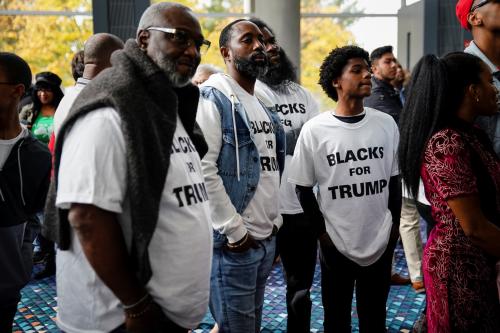The full version of this op-ed is available on Quartz Africa.
Cameroonians used to praise their country as Central Africa’s oasis of peace and security, but the 2018 presidential election will be strained by insecurity and violent extremism in at least three of the 10 regions. With nine presidential candidates preparing for the vote on Sunday, Oct. 7, it is important that they all have an appeasing post-electoral message focused on peace and security.
I described the risk to peace as “embryonic” in 2011, when I was providing options to prevent instability and conflicts at the eve of the presidential election that year. Unfortunately, the situation has degenerated since 2012 both with the insurgent terrorist group Boko Haram that has extended its actions from Nigeria to the broader Lake Chad basin, including the far North region of Cameroon; and with the separatist crisis involving the English-speaking Northwest and Southwest regions. Given this year’s presidential election, political players should take serious action to prevent the risk of further deterioration in violent conflicts.
President Paul Biya, who has been ruling the country since 1982, easily won re-election in 2011 and will most likely win the 2018 election. In fact, similar to seven years ago, the present context in Cameroon, in the run-up to elections, is characterized by specific political and institutional configurations. These include a strong, organized, and dominating ruling party and leaders, which has a strong electoral machine throughout the country and has been dominating the political arena since 1960, first as the Cameroon National Union (CNU) until its transformation into Cameroon People’s Democratic Movement (CPDM) in 1985.
Biya is backed by some well-known figures with historical connections to the opposition as well as about a couple dozen of smaller opposition parties. With such support accompanied with the organizational and financial resources at its disposal, it is unlikely CPDM will be seriously challenged.
The opposition parties are weak and disorganized, despite the rise of new candidates, who could have made a difference if they were all united. Although a lower number of candidates are represented for this election (nine initially validated by the electoral management body, compared to 23 in 2011), the opposition has thus far failed to present a single collation candidate, and under such circumstances, each candidate stands almost no chance of winning alone.
Conscious of such challenges, some members of the opposition are trying to work together but the current efforts have not yet led to outcomes significant enough to change the electoral prospects of the opposition. For example, on Friday (Oct. 5), the presidential candidate Akere Muna of the Popular Front for Development withdrew his candidacy, and called on his supporters to vote for Maurice Kamto (Cameroon Renaissance Movement) as well as encouraged the six remaining opposition candidates to follow his lead.
Although this move was welcomed by many, the significance is limited as alliances exclusive of the Social Democratic Front (SDF) which has the second highest representation in the parliament would mostly be symbolic.
Security challenges
Security forces are already stretched given conflicts in the far North against Boko Haram and Southwest and Northwest regions against separatists, and will not tolerate unrest from a contentious election that could aggravate an already unstable situation. In fact, Boko Haram, which started engaging with violent extremism about nine years ago in Nigeria, has also been targetting the far North region of Cameroon with suicide bombings and raids. Overall, more than 25,000 people have been killed, 2.6 million displaced, and 26 million affected in the Lake Chad basin (Nigeria, Cameroon, Chad, and Niger).
As for the Southwest and Northwest regions of Cameroon, what was initially a protest movement of lawyers, teachers, and other citizens has degenerated into a more complex separatist crisis. Now, some separatist factions in the two English-speaking regions have threatened to boycott the elections on Sunday, increasing the risk of further violence. Insecurity in the far North also poses risks to the voting process.
Cameroonian citizens strongly support democracy but are concerned about the country’s economy and security according to the latest Afrobarometer survey. A majority (67 percent) of citizens prefer democracy to alternative forms of government. Citizens are divided on the country’s economic performance with 45 percent supporting the current direction versus 48 percent who think the economy is off-track. Lastly, 39 percent of respondents feared some level of political intimidation although only a small minority (16 percent) had significant fears.
Almost seven million Cameroonians are registered to vote and for the second time in its electoral history, the Cameroonian diaspora is allowed to vote from outside of the country. There are about 13 million people eligible to register to vote and the low level of registration could be attributed to voter apathy, intentional boycott, or security challenges.
Read more about the solution to prevent violence in Cameroon here.




Commentary
Op-edCameroon’s contentious elections come at a precarious time in the country’s history
October 6, 2018